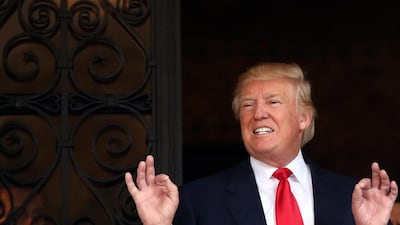The uneasy detente between regional airlines and their US rivals may be about to dissolve as competitive pressures are stoked by global overcapacity and hawkish trade policy.
Two years of mud-slinging between the big three US carriers and their regional counterparts over allegations of state subsidies had started to fizzle out this year.
But the election of Donald Trump as the next US president and his America First trade agenda presents a potential new platform for the aggrieved trio of United, American and Delta.
With the presidential inauguration less than a month away, the aviation sector like other industries is waiting to see if the protectionist rhetoric of Donald Trump the candidate germinates into real economic policy.
“What transpires will depend on what view is formed concerning the criticisms put forward by the US big three carriers and how these are weighed against the consumer and economic benefits to US cities of direct services operated by the Gulf carriers,” said John Strickland, director at JLS Consulting. “Along with this will be consideration of the massive export value of aircraft orders by the Gulf carriers and the jobs which these support.”
Two key figures in the incoming US administration that regional carriers will look to for clues on future aviation policy will be transportation secretary nominee Elaine Chao and Peter Navarro who was on Wednesday named the head of the newly formed White House National Trade Council.
The US carriers have long claimed that their Gulf counterparts benefit from illegal subsidies that run into billions of dollars – an allegation that has been denied by Emirates, Etihad Airways and Qatar Airways,
Both sides have spent heavily defending their cases, hiring lobbyists, commissioning reports and in the case of Emirates enlisting Friends star Jennifer Aniston to feature in an advert that flaunted the luxury of an Emirates premium cabin at the expense of competing American airlines.
But for anyone who thought the row over subsidies had subsided, the chief executive of Delta Airlines reminded everyone during a webcast earlier this month that it most definitely had not.
He said that US airlines should be the “poster child” for the Trump administration in enforcing Open Skies rules.
“We are facing Middle Eastern carriers that are violating the law,” said the chief executive Ed Bastian. Emirates has been the most vocal of the big three Gulf carriers in responding to the subsidy claims of the US airlines.
In a speech to the Aviation Club of the UK earlier this month, the Emirates president Tim Clark said that aviation was at an inflection point.
“Our industry has done well in the past years on the wings of global trade and liberalisation, which are key catalysts for global aviation growth. However, all that is at risk of getting derailed by protectionism and inward-looking policies.”
But he also sounded a note of optimism.
“Discounting all the bluster and growl of his campaign, I am quietly hopeful that Trump, who has had many business interests outside of the US, isn’t opposed to free trade.”
Etihad Airways declined to comment on US aviation policy.
A spokeswoman for Qatar Airways said that airline chairman Akbar Al Baker had “stated often in the past that he believes the US government will rule wisely on the matter before them”.
Emirates, along with other Gulf carriers, ramped up capacity in the US during 2015 – much to the chagrin of its competitors in the country.
But until this month it had not added any more routes since September 2015, when it started flying to Orlando.
Fort Lauderdale last week became the carrier’s 11th destination in the US, where it now operates 119 passenger flights every week.
As significant as the emerging hawkish trade policy of the new US administration is the slowdown in passenger growth in an industry that for the moment has too many planes and not enough passengers.
That is hurting not only the US carriers but also their rivals in the Middle East, where the rampant growth of recent years is starting to stall forcing airlines such as Etihad and Emirates to cut jobs and trim costs.
That makes the potential resurrection of the subsidies spat in 2017 all the more troubling for regional airlines.
scronin@thenational.ae
Follow The National's Business section on Twitter

